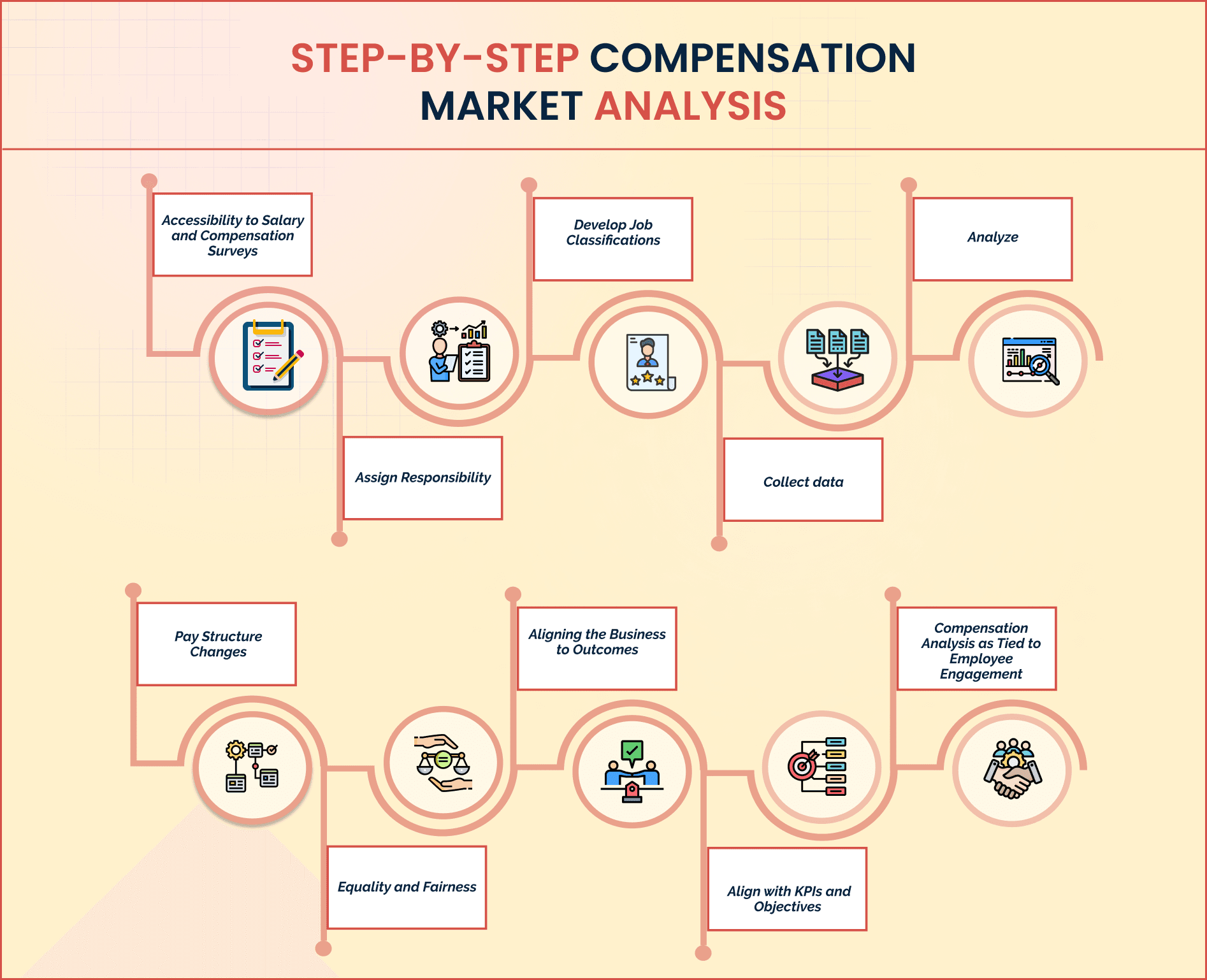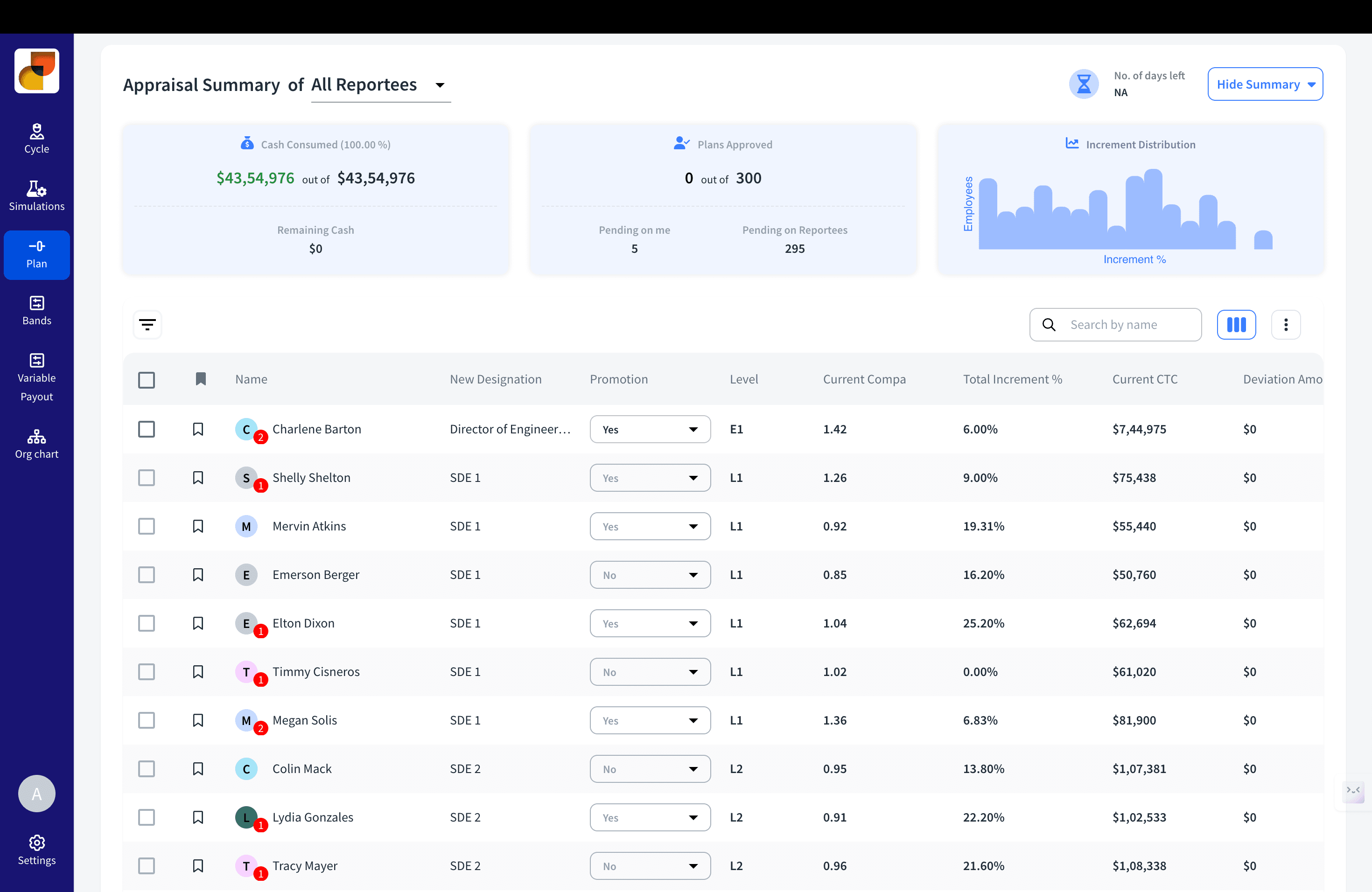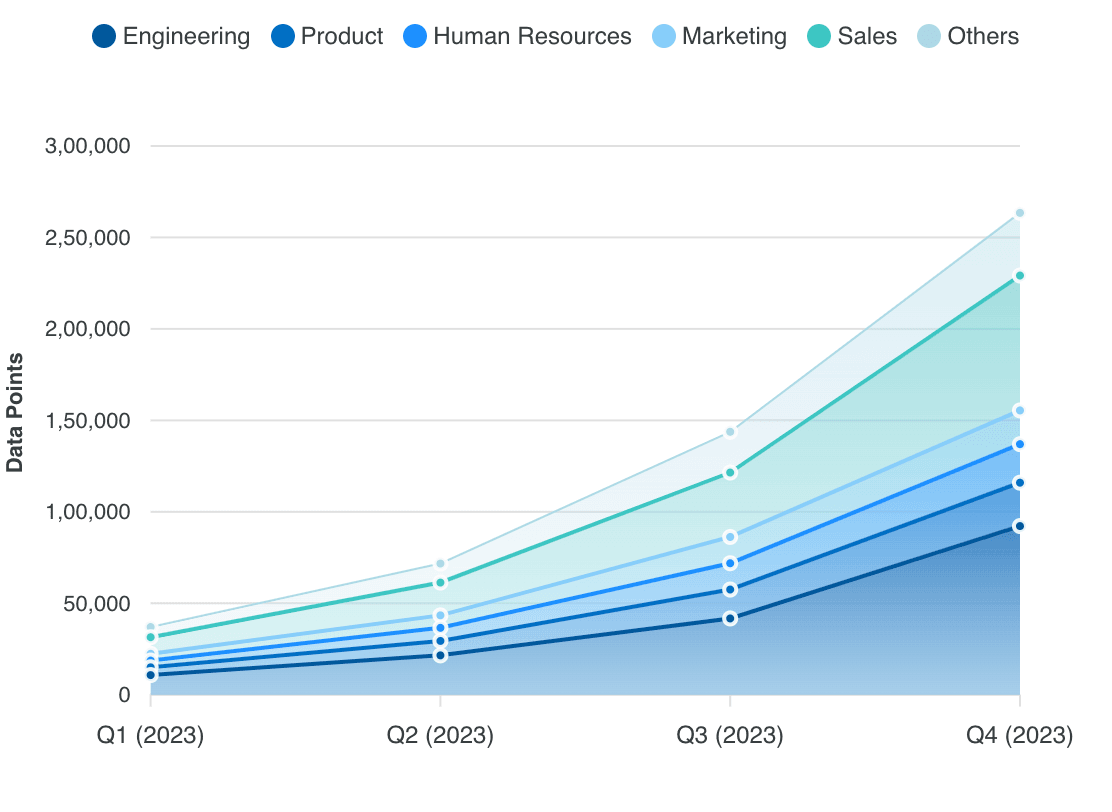
In this day and age of stiff competition in the job market, compensation analysis has been seen to be one of the most vital tools for HR managers.
According to Gartner, 75% of HR leaders consider compensation strategy crucial for attracting and retaining talent, while organisations with optimised pay structures see a 20% higher rate of employee engagement and productivity.
This guide dives deep into the essentials of compensation analysis, providing HR professionals with a roadmap to create fair, competitive, and transparent pay practices that align with organisational goals.
Compensation analysis is the structured process of pay structure review conducted by an organisation to ensure how compensation is competitive and fair. It involves examining how the base salaries, bonuses, and also benefits compared to marketplace standards are offered.

According to WorldatWork, "organisations that regularly conduct a compensation analysis experience a 30 percent reduction in turnover since fair and transparent pay practices are largely connected with employee satisfaction and retention".
Compensation analysis provides a basis for competitive and fair compensation strategies; thus, it holds a very crucial position in the success of organisations as well as employee satisfaction. It is important as follows:
As competition increases, with job applicants valuing compensation over other considerations, being a leader in the job market becomes a necessity. The 2023 Global Talent Trends report by LinkedIn reveals that 65% of the respondents have compensation as the biggest consideration for evaluation when considering a job offer. An effective compensation analysis keeps the organisation ahead while attracting talents and raising the employer brand.
Transparency and accountability in compensation practices form the base of the development of trust. A study by SHRM (Society for Human Resource Management) reveals that organisations which pay clearly have employee engagement showing 22% higher levels because they feel that they are being treated justly and equitably.
Gender and race pay inequality are topics which have received more attention recently. In fact, a PayScale report for the year 2023 indicated that the workers indicated that they would quit their jobs if they did feel that they were unfairly paid. It is during compensation analysis that an organisation finds out pay discrimination and solves it and thereby the employees' morale increases and that translates to a reduction in the rate of turnover.
If employees believe that their performance is rewarded fairly, then the probabilities of them staying motivated increase. As such, Gallup maintains that companies that state and practise pay-for-performance policies have a 17% increase in productivity and 12% less absenteeism. Compensation analysis enables companies to align rewards with corresponding measures of performance; therefore, it nurtures a high-performance culture.
Here is the step-by-step procedure of conducting a thorough compensation market analysis:

The source of information, like CompUp and PayScale, for market rates will determine data accuracy. It will be very useful for HRs to make compensation decisions accordingly.
Introduce responsibility either of a team or person for job classifications so that there will be no pay disparities and the organisation's objectives align with decisions regarding compensation.
Job classifications would act as a comparison base. The definition and categorization of roles based on skills and duties by the HR teams would make sure that the payment structures are comparable for similar roles within the organisation.
Use both internal and external data, job description, required skills, and market rates. This would ensure that pay decisions are taken based on industry benchmarks and organisational needs.
Analysis on pay gaps or disparities is also critical. Research from Korn Ferry showed that employees' satisfaction boosts up by 14% if the pay bands of the companies are well structured.
Based on your observation, you may have to do pay structure changes which let you remain competitive and fair. In fact, research studies have shown organisations having current pay bands have lower rates of turnover and higher employee satisfaction.
Transparency with pay creates trust between employer and employee. Glassdoor revealed that 67% of employees would accept lower wages if they thought the company was transparent about its pay.
Make sure compensation policies align with other organisational outcomes. Paying employees based on company achievement bolsters any business's desire for a motivated and unified workforce.
Put in place and monitor KPIs about your compensation policy so you'll know whether you are successful and where you have opportunities for improvement. Ongoing monitoring ensures compensation remains current with company performance and the marketplace.
One of the direct determinants of employee engagement is compensation analysis. The Global Human Capital Trends Report by Deloitte indicates that companies with competitive pay practice enjoy an employee engagement score that is 29% higher than those whose pay practices are outdated or non-competitive. Fair compensation renders a sense of value and belonging, to be cherished when working to raise an engaged workforce.
Building a well-structured compensation plan is only a first step. Its real test is in implementation as strategy meets reality with a successful rollout requiring clear, organised planning. Implementing your compensation plan follows these steps:
Stay ahead of trends in industry and location. Reliable data allows your pay structure to be competitive as well as attractive. Gartner says that companies that track report pay trends may stand to gain up to 15% improvement both in attraction and retention of top talent.
It is only by first ascertaining the specialised skills, responsibilities, and value that determines true compensation that what each role is expected to deliver can be ascertained. In the process of ensuring a comprehensive job analysis, one should be sure to clearly define role requirements and define any skill gaps. This will help you set pay ranges that reflect both the demands of the position and the market's expectations.
For each job, establish a pay range consistent with market data and organisation budgets. It will then be internally consistent and less likely to reveal discrepancies. Clearly defined pay ranges also enable employees to get a clue on how much more they could be paid for doing something, thereby raising motivation and job satisfaction.
Keeping on top of labor laws will save you from many headaches. Learn about the wage and labor law that applies to your business, such as minimum wage, overtime pay, and anti-discrimination. It saves you those costly penalties, but more importantly, it helps begin the ethics of fair pay practices.
Use compensation structure and pay scales as a chance to build trust. Generalize how decisions about pay are made. Then, avoid disclosing individual pay in public as an approach to create an open culture. A Glassdoor survey reported that "when employees understand how their compensation is determined," 70% report they are more satisfied.
Key to retaining and executing the compensation strategy is managers. Educate them on the pay structure and be able to answer questions while making sure they communicate the value to their teams clearly. Informed managers can correct misinformation and ensure that the policy is implemented fairly.
The business needs to align a compensation plan. Review the plan's effectiveness in achieving organisational objectives and employee happiness periodically. Annual reviews of compensation strategies among companies reveal them to be aligned with market changes and actually see an improvement in retention rates.
Such steps taken by your organisation allow it to not only attract and retain top talent but also a fair, transparent, and engaging workplace to its employees.
With today's frenetic job market, keeping compensation packages competitive as well as transparent is of utmost importance. It is here that CompUp can be helpful.
CompUp is a comprehensive tool that has been designed to guide the pay equity evaluation, access real-time salary benchmarks, and develop structures of compensation aligned with both marketplace standards as well as the unique goals of your organisation.

Using CompUp, the organisations can

By leveraging the strength of CompUp, the HR leader can create a compensation package that is perceived as inspiring trust and clearly commits to fairness. This not only helps increase employee loyalty but also companies' reputations as a great place to work.
Effective compensation analysis is more than paying competitively-it's a way of moving toward a totally fair, clear, and motivating environment for both satisfying employees and succeeding in business. The thoughtful, data-driven approach to compensation involves enabling organisations to attract the best talent, retain it, reduce turnover, and enhance overall employee engagement.
For HR leaders looking to simplify this process, there is CompUp. It arms your team with real-time market data, actionable pay equity insights and custom compensation structures that craft the very compensation plan that integrates with an organisation's goals in fulfilling the expectations of every employee.
Take your next step towards competitive and transparent compensation packages. Have a demo with CompUp today and learn more about how we can transform your compensation strategy.
Community Manager (Marketing)
As a Community Manager, I’m passionate about fostering collaboration and knowledge sharing among professionals in compensation management and total rewards. I develop engaging content that simplifies complex topics, empowering others to excel and aim to drive collective growth through insight and connection.
Revolutionizing Pay Strategies: Don't Miss Our Latest Blogs on Compensation Benchmarking